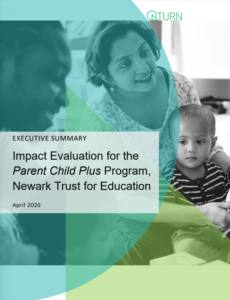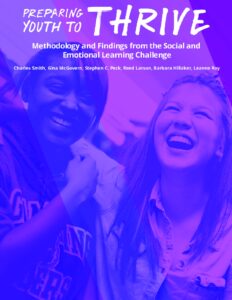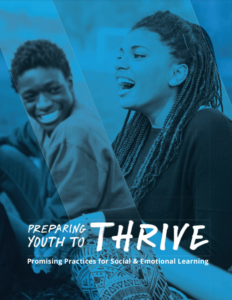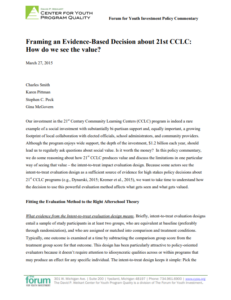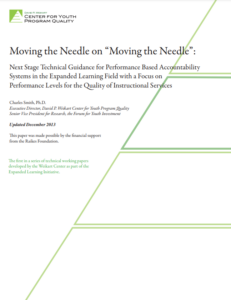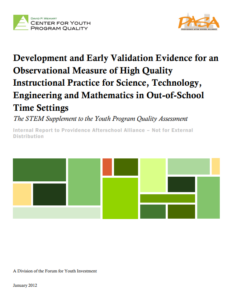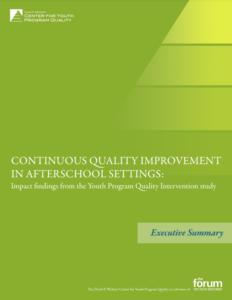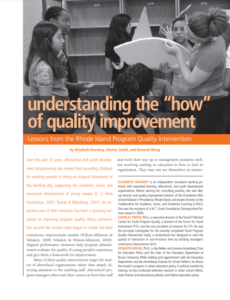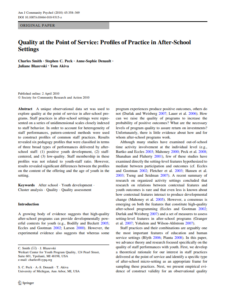This Executive Summary was developed to facilitate discussion and decision making. The detailed findings and method are available in the full report, Impact Evaluation for the Parent Child Plus Program, Newark Trust for Education (2020).
Preparing Youth to Thrive: Methodology and Findings from the SEL Challenge
This technical report describes methodology and findings for (1) best-practice SEL standards, (2) validation of a suite of SEL performance measures for use in QIS, and (3) performance benchmarks for out-of-school time programs focused on building SEL skills with vulnerable children/youth.
Preparing Youth to Thrive: Promising Practices for Social Emotional Learning
The guidebook describes SEL standards and organizational and curriculum features for a set of eight exemplary SEL programs.
Framing an Evidence-Based Decision About 21st CCLC
In this policy commentary, we do some reasoning about how 21st CCLC produces value and discuss the limitations in one particular way of seeing that value – the intent-to-treat impact evaluation design.
Moving the Needle on “Moving the Needle”
This paper introduces the nomenclature of performance-based accountability systems (PBAS) to the expanded learning field, provides a policy case study for a countywide system in southern Florida and uses data from that system to explore the issue of quality thresholds. We present an expanded design standard to guide development and improvement of PBAS policies and further develop a theory of lower-stakes accountability to guide effective use of incentives of various types. Findings suggest that (1) the PBAS framework defines critical concepts and improves our ability to describe existing quality improvement systems, (2) the Youth Program Quality Assessment (Youth PQA) can be used to produce a program rating of sufficient reliability for use in a PBAS, and (3) that the Palm Beach County PBAS design is an exemplar for expanded learning policies.
Measuring Youth Skills in Expanded Learning Systems: Case Study for Reliability and Validity of YDEKC Skill Measures and Technical Guidance for Local Evaluators
This paper uses pattern-centered methods to increase the usefulness of information available from survey-based skill measures, with a focus on using survey-based skills measures to detect skill change over time.
The STEM supplement to the Youth Program Quality Assessment
This report describes the process of development of the STEM supplement to the Youth Program Quality Assessment and preliminary reliability and validity evidence based on data collected during The Afterzone Summer Scholars program sponsored by the Providence After School Alliance (PASA).
Continuous Quality Improvement in Afterschool Settings: Impact Findings from the Youth Program Quality Intervention Study
The David P. Weikart Center for Youth Program Quality conducted a three year intervention study to examine the Youth Program Quality Intervention (YPQI). The YPQI is a data-driven continuous improvement model for school and community-based sites serving youth during afterschool hours.
Understanding the “How” of Quality Improvement: Lessons from the Rhode Island Program Quality Intervention
Case study of scaled QIS implementation in Rhode Island with focus on manager skills and implementation at the organization level.
Quality at the Point of Service: Profiles of Practice in After-School Settings
This paper uses pattern centered methods to identify three different quality profiles (high, medium, and low) that characterize staff instruction in out-of-school time programs.
